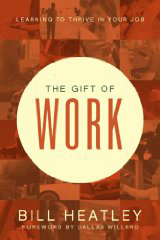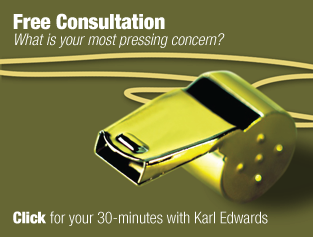The Gift of Work -> Chapter 1: Changing Our Minds About Work
 I’m going to jump right into the issues raised by Bill Heatley’s The Gift of Work: Spiritual Disciplines for the Workplace without much content summary. So grab your copy and join the fun!
I’m going to jump right into the issues raised by Bill Heatley’s The Gift of Work: Spiritual Disciplines for the Workplace without much content summary. So grab your copy and join the fun!
Faulty Frames of Reference
Powerful from the get go is his challenge to our basic frame of reference about work as “a daily humiliation.” (p. 24) Such starting assumptions: work is but a necessary evil to pay the bills, TGIF, and working for “the man”—among others—is where we get our equation backwards. It’s as if we suspend our lives while at work in order to make the money we need to finance the lives we want to live while at home. We have to get ourselves dirty in the workplace (read “the world”) in order to serve God and others everywhere else.
Instead of investing, engaging, reflecting and improving, we end up keeping work at arm’s length.
A huge hurdle to becoming open to alternate frames of reference is learning how to identify our own starting assumptions. It can be like asking a blind person why they tripped on the cracked sidewalk. How can I figure out what I’m not seeing if I’m not seeing?
More Ordinary Than You’d Think
I love the way Heatley, almost matter-of-factly, asserts that work is merely one of life’s many structures. The Christ follower’s responsibility is simply to love within whatever structure one finds oneself.
Our role shifts from judging work as a bad or worldly place from the sideline to jumping into the game and participating fully as a caring and creative steward of our lives.
More freedom and more responsibility. Hence Heatley’s guiding categories that work has both caring and creative components. If we’re going to show up and engage unreservedly, then where do we begin and along what lines to we function?
I would add a category. Like other life structures, work also has a learning or maturing or personal development component. We are fundamentally growing, changing, improving beings and our work/professional direction is best served by incorporating this reality from the beginning.
Using my own vocabulary, work is where our love task takes the form of finding meaningful ways to contribute, connect and develop.
What Do You Think?
- What is your experience with work as one of your life structures? Love it? Hate it? Mystified by it? Weighed down by it? Distracting, fulfilling or depleting?
- What was your own main take-away from Chapter 1? What struck a chord, challenged an assumption or left you puzzled?
- What do you think about what I said? Add your insights or push back.
Join the conversation. Let’s learn from each other.








March 6th, 2009 at 5:37 pm
A fine first chapter! Heatley challenges us — and in very practical ways, via “work disciplines” — to bring Christ into our work. Certainly, it is all too easy to chop work off, like a gangrened limb, from our spiritual and emotional lives. Such a procedure must be doomed to fail, however, because work is part of who we are as created beings and because it’s where we spend so much of our time. So I appreciate how Heatley encourages us to redefine work.
Now, I haven’t read further into the book, but he’s not yet explicitly addressed the issue of work in the condition of the fall. While the first thing to say must surely be that work is part of the creation, part of what it is to be fully human, we would be engaging in wishful thinking if we left it there. Work is now part of the “curse” — a strong word, but Studs Terkel’s take certainly captures this. At this point, I’ll just say I’m waiting to see how Heatley will take this up. How many people are able to call their work their “vocation”? “Ah, there’s the rub!” as Hamlet would say. Globally, as well as locally, that number has got to be pretty small.
Still, even in the midst of a creation under the condition of the fall, we have to find ways to bring redemption into our work. It is all too easy to keep that arms’ length distance from work you spoke of, Karl. But that would be to compound sin with the fall. So I think Heatley is off to a great start here. His challenge is clear: whether our work is just a “job,” or our heart’s “vocation,” we have both the opportunity and the duty to fill it with creativity and care.
March 8th, 2009 at 5:12 pm
T.E. Brown, you have a great way of saying simply what I tend to complicate. Creation, fall, redemption.
I don’t like the fall. I find myself skipping right over it to redemption. Let’s get on with fixing, renewing and re-creating this foul mess. But the way forward is not as simple as saying, “Let’s all get along.” Stating the self-evident has never worked.
Hence the responsibility to choose creative and caring ways to show up at work. There’s no street map or directions to where we need to go. We need a good compass, a good head for navigating in the wilderness, and a fellow traveler or two along the way.
March 13th, 2009 at 3:19 pm
Great thoughts regarding chapter 1. I do take up the fallen state of work and the world but wanted to begin with an untainted vision first. I think its helpful, like the way bank tellers are trained to spot counterfiet bills, they memorize what a perfect bill looks like and then can easily spot the fakes.
God bless